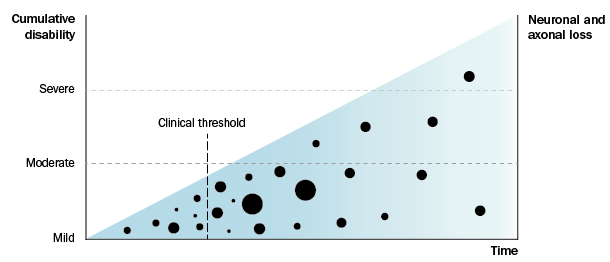Overview of multiple sclerosis
Multiple sclerosis (MS) is an inflammatory disease of the central nervous system. Earlier in the course of MS, discrete demyelinating lesions cause axonal and neuronal damage. Later, diffuse inflammatory processes and neurodegeneration exacerbate central nervous system dysfunction. The result is progressive disability (see Course of multiple sclerosis). The emphasis in treating MS is on:
- introducing immunotherapy early, to slow or minimise disability
- using corticosteroids for acute inflammatory clinical events (relapses)
- easing symptoms caused by neurological damage (eg pain).

Background shading represents general inflammation of the central nervous system, which decreases over time (as degenerative processes increase).
Black circles represent discrete inflammatory events that cause brain, spine or optic nerve lesions and present as clinical attacks or appear as lesions on magnetic resonance imaging.
Trajectory is different for each patient.
The risk of MS in the general population is 0.1%. The first-degree relatives of a patient diagnosed with MS have a 3 to 4% risk.
Discrete inflammatory events cause brain, spine or optic nerve lesions and present as clinical attacks or appear as lesions on magnetic resonance imaging (MRI) (some lesions are too small for resolution by MRI). These events cause acute damage, are associated with adaptive immune infiltrations (so can be treated) and diminish over time. Generalised inflammation (eg microglial activation) continues even after the discrete inflammatory events diminish, and over time is accompanied by increasing neurodegeneration.
The contribution of inflammation and neurodegeneration varies among patients. Relapsing-remitting MS has an early inflammatory course with secondary degenerative changes (secondary progression). Primary progressive MS can be associated with greater degenerative change earlier in the clinical presentation.
Multiple sclerosis is relatively rare in childhood and adolescence—the disease starts before the age of 16 years in 2 to 5% of patients, and the course in children seems to be slower than in adults. More than 90% of children with MS have relapsing-remitting disease; primary progressive MS is rare. Refer a child with MS for expert care.
Patients with clinical disease activity mainly present with symptoms that are subacute, consistent and often progressive, lasting several days and referable to one part of the central nervous system. Any MS symptom can occur as part of a relapse, but symptoms that are chronic, transient or relatively isolated are less likely to be due to acute inflammation. Although the mainstay of MS treatment is immunotherapy to prevent damage, over time, symptomatic therapies are needed.
